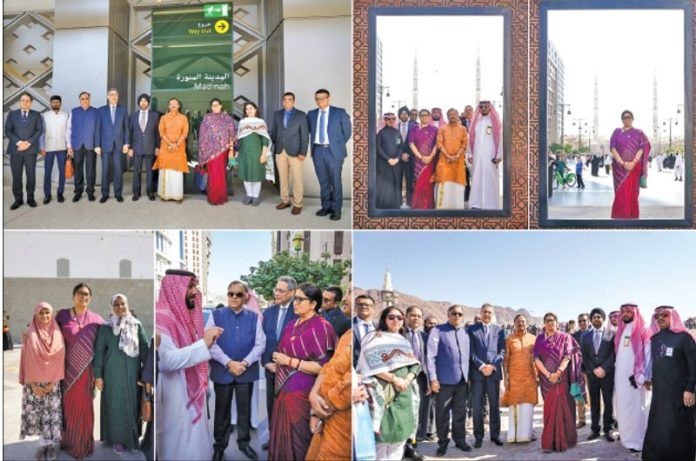India’s Minister Smriti Irani, leading a government delegation, made an unprecedented diplomatic visit to the holy city of Madina Munawara in Saudi Arabia. The delegation’s tour included significant Islamic landmarks such as Masjid Nabawi, Uhud Mountain, and Masjid Quba. What makes this visit particularly noteworthy is the exceptional access granted to non-Muslim dignitaries, breaking the norm of a complete ban on their entry into Makkah and certain parts of Medina.
The ruling Bharatiya Janata Party (BJP) orchestrated this two-day official visit, making it a remarkable instance of non-Muslims being allowed into the holy city. Minister Smriti Irani, along with V Muraleedharan, Indian Minister of State for External Affairs, led the delegation, and the group was granted special permission by Saudi authorities for this visit.
Adding an interesting dimension to the delegation were two women, including Nirupama Kotru, a Kashmiri Pandit IRS officer, who were part of the group. Their attire, including saris and Shalvar-Kameez without head coverings, emphasized the exceptional nature of their presence in a traditionally conservative setting.
The visit carries historical significance as it allows non-Muslim dignitaries to explore and pay respects to crucial Islamic sites. Irani highlighted the depth of cultural and spiritual engagement during her visit, which included Al Masjid Al Nabwi, the mountain of Uhud, and the Quba Mosque, the first mosque established by the Holy Prophet Muhammad (SAW). The visit is expected to provide insights into the logistical requirements for the upcoming Haj pilgrimage, and a Bilateral Haj Agreement for 2024 was signed between India and Saudi Arabia during this time.
Beyond religious and cultural exchanges, the visit included discussions with Saudi and Indian business professionals to explore investment opportunities and foster stronger economic ties. This aligns with India’s broader strategy of deepening relationships and expanding trade in the Middle East, particularly with Saudi Arabia.
This diplomatic visit signifies a groundbreaking engagement between non-Muslim dignitaries and the holy city of Madina Munawara. It not only reflects the strengthening ties between India and Saudi Arabia in terms of religious and cultural understanding but also underscores the economic cooperation and trade relations between the two nations. The visit serves as a notable chapter in India’s evolving foreign policy in the Middle East.


